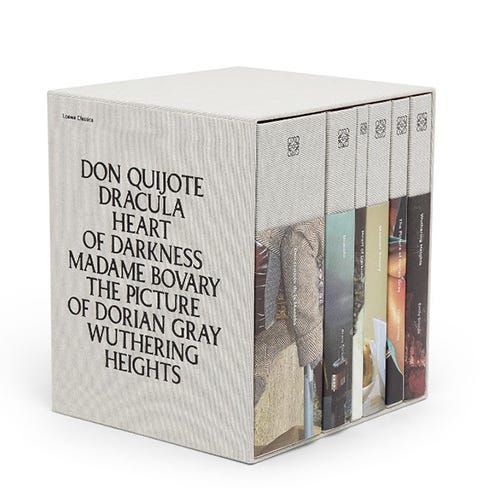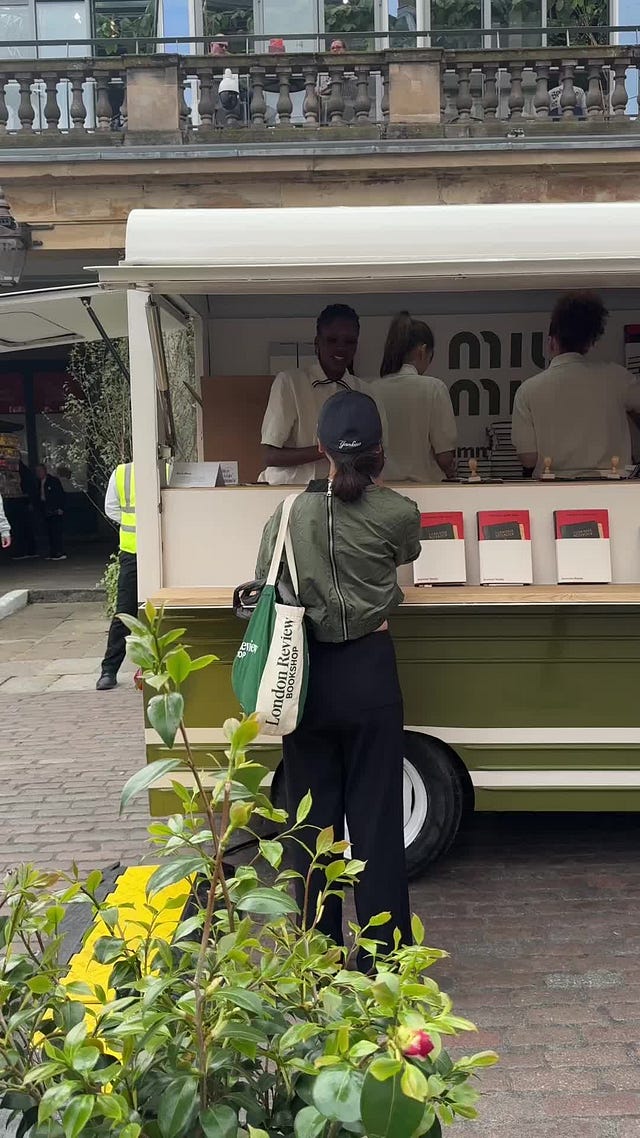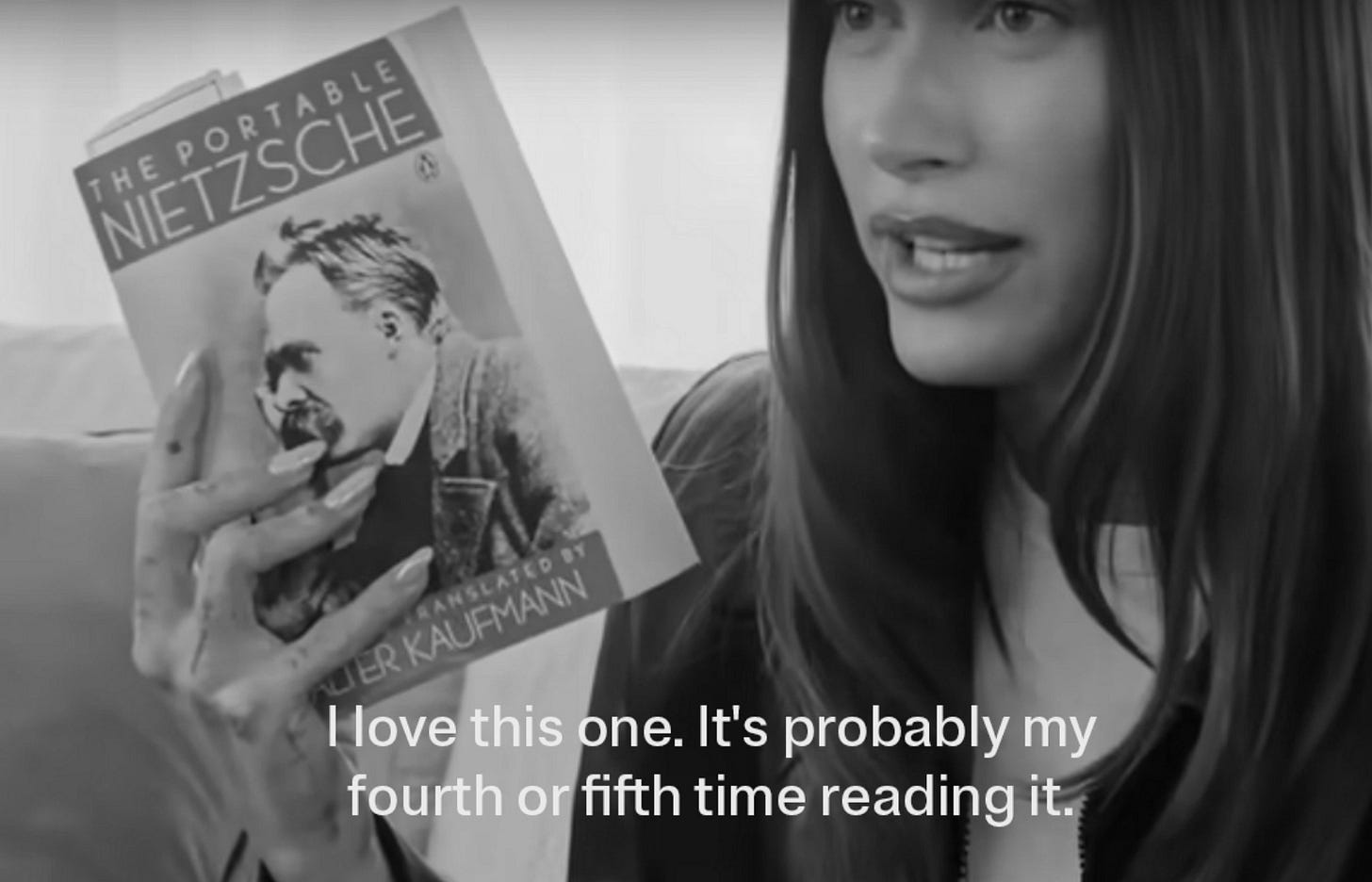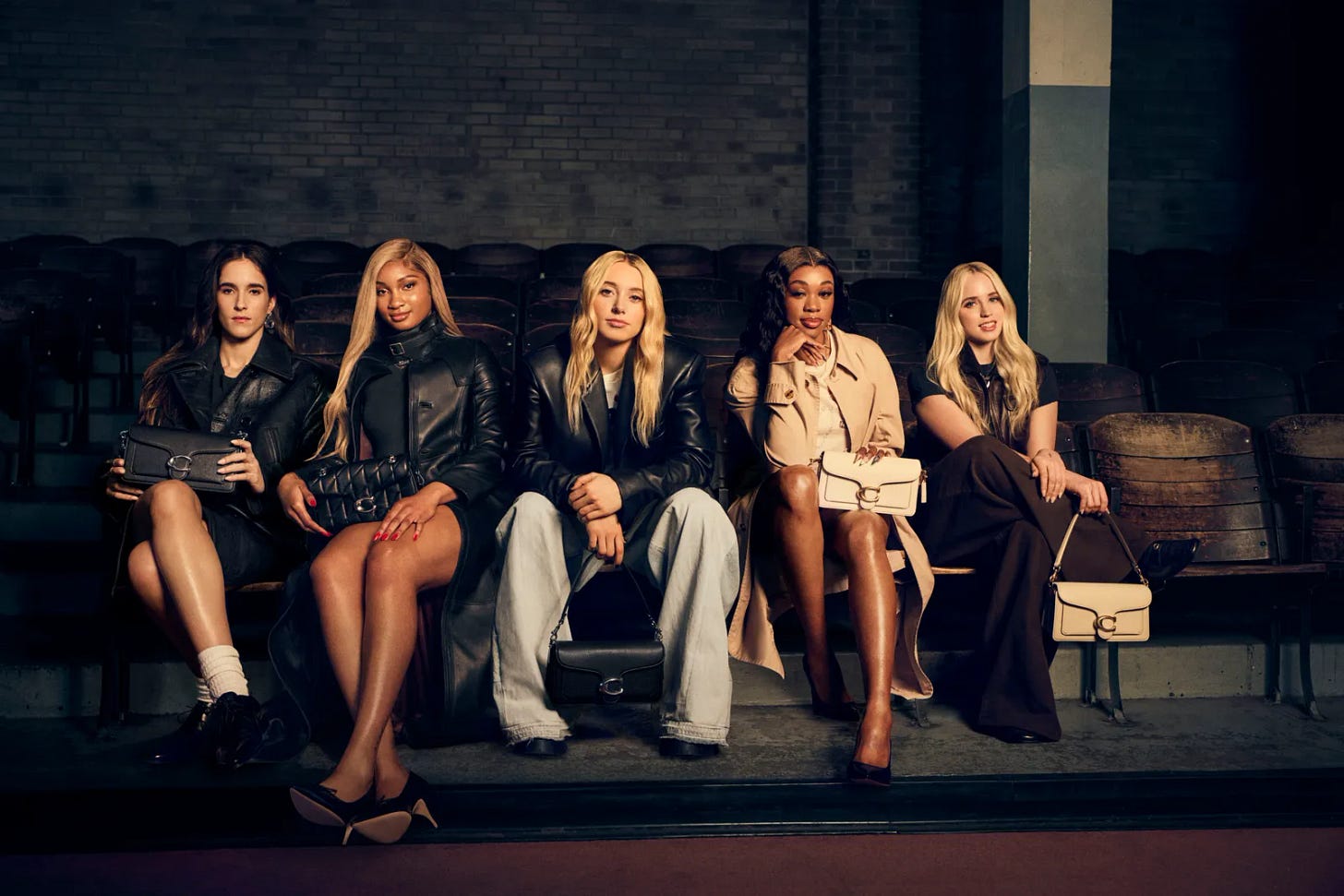Why is reading so damn cool right now?
"Go to the literature" - Joan Didion
TL;DR: In a world that runs on instant gratification, books…especially the dense, complicated kind…have staged a surprising comeback. But is it actually surprising?
Just a few years ago, talking about Heidegger at a party would've been social suicide. This week, Hailey Bieber's pulling out philosophy books for lols in a Vogue video.
Yes, it’s satire. But it’s also not.
Dua Lipa has a library in her house, runs a wildly popular book club, and has become, says The Guardian (and me) our generation’s best literary interviewer. Big fashion influencers are also branching out into book clubs, taking their brand partnership muscle with them (see Lizzy Hadfield’s Buffy’s Book Club x J.Crew). So is Miu Miu, who also ran a global brand activation last summer giving away female-authored modern classics (see Luxury Endless’ TikTok vid below in Covent Garden, London). Marc Jacobs posts selfies with high-brow novels. Loewe created a $590 classics set. Reading retreats are selling out like Glasto tickets. And remember the flaunting of advance copies of Sally Rooney’s Intermezzo last year?
What is going on? And why?





 Tiktok failed to load.
Tiktok failed to load.Enable 3rd party cookies or use another browser
I have to admit I dropped the ball on this one. A pattern I didn’t recognise for what it actually was. I think because I have always been a reader. My friends and I have always talked to each other about books. I go to a bookshop when I need a breather. I have a back-up Kindle (I know). Reading has always been cool in my house. And the algorithms have probably always known this about me. So I guess I didn’t notice the volume going up on this stuff. But it has. Massively.
From techno-optimism to the Thought Daughter
Once upon a Silicon Valley TED Talk, the cool kids outsourced their knowledge-gathering. Reading was analogue, an inefficiency. Don't know something? Google it. Why spend your time in a library or bookshop when you could spend (less of) it in front of a screen? Reading old books made of paper was for people who couldn't code. Even turning a page was an inefficiency when there were Kindles to be Primed to you (guaranteed by 10pm). Bookshops had a hard time in this era…rents were rising, books were being PDF'd and shared online.
But things have changed. The same internet that once celebrated life-optimised hustle and grind founders and start-up bros is now worshipping their weirder cousin, the Thought Daughter. Annotated Sontag, desk lamp aesthetics, playlists to read to. Bookish, ironic, and just a bit unapproachable. The off-beat intellectual Miu Miu girl, on her day off. Gwyneth as Margot Tenenbaum. Not Gwyneth as Goop wellness CEO.
And despite savage headwinds, bookshops are showing remarkable resilience. In the UK, the number of independent bookshops is up 21% since 2016. In the US, general bookstore sales saw an 6.2% increase between 2021 and 2022 (I can’t find more recent data).
Young people are reading more books than any other generation. 83% of U.S. adults aged 18-29 say they’ve read at least one book in the past year - the highest among all age groups surveyed [Pew Research]. And young people seem to prefer print over ebooks. Among UK book buyers aged 13 to 24, hard-copy print accounts for 80% of their book purchases [Nielsen BookData].
Beyond the obvious…friction in our fiction?
"We've kind of gone from people working their way through the bestseller lists to people coming in and seeking out books that are more off the beaten track," my local bookseller told me.
It does feel like publishing is slowly become more inclusive in some ways - a wider range of voices, experiences, and formats (like graphic novels and genre hybrids) are maybe helping people find books that speak more directly to their lives.
And yet, for every Open Water or Tomorrow, and Tomorrow, and Tomorrow…books that broke through quietly, tenderly, without being part of a franchise or having a famous-face author…there are dozens of sequels, spinoffs, or algorithm-bait. The publishing world still tends to lean toward the depressingly familiar.
But something's bubbling. Smaller, stranger books are going viral in niche corners of the internet. Remember that weird sudden clamour around Dostoyevsky’s White Nights last year?
Maybe the real shift isn't visible in the metrics yet, but it's there in the Reddit threads and the book clubs and in the more obscure side of BookTok. Maybe this isn't a publishing revolution. Maybe it's a reader one.
Hailey, Heidegger & the high-IQ flex
Last week's Vogue parody from Hailey stopped me in my tracks. ICYMI, as part of a wide-ranging satirical takedown of her own character, she pulls out two obscure philosophy books and faux-casually recommends them.
Like all good jokes, it works because it taps into something real. Hailey knows the cultural temperature (I mean, this woman is smart…you see her billion-dollar Rhode x elf deal yesterday?). The books aren't casual props, they're intellectual status symbols…
The new status symbol: a good book?
There's a feeling of luxury around reading imo: it takes time to get through a book. The friction…the very thing that once might have made reading seem inefficient…has become part of its appeal.
And lately our TV and films are full of characters who signal their interiority through their reading.
In The White Lotus, books are subtle character cues: Camus on the beach, Tanya with the Madame Bovary. YOU's Joe Goldberg uses his literary taste as a weapon in his insidious, disarming, addictive charm. In Normal People, the characters’ reading is laden with their sexual tension. And The Chair, Conversations with Friends, and Euphoria all use books as visual shorthand for characters’ vulnerability or depth. How about Lady Bird clutching The Bell Jar, or Greta Lee's quietly brilliant writer in Past Lives?
Right now reading is cinematic. Epic. Sexy.
Even the platforms where people track and log their reading are changing. Goodreads, the Amazon-owned behemoth with over 125 million users, is increasingly being abandoned for StoryGraph, an independent alternative built (by a visionary Black woman called Nadia Odunayo) that has grown so rapidly new signups crashed their servers in January 2024. People are rebuilding their entire reading histories rather than let Amazon monetise their literary tastes. When choosing how to track your books becomes a statement about your values as a person, reading has moved well beyond casual pastime into identity-forming territory.
Why now though?
Is intelligence itself the new status symbol?
I've written before about what I call status sentience - a seismic evolution in how we decide what's cool, relevant, or worth aspiring to. When every major system (political, economic, tech) is designed to shape and narrow and shallow your thoughts, it’s a flex to think clearly, broadly and independently. The world feels led by those who would rather you didn't think very much at all.
This connects to what I've written about as the rise of what I’ve been calling Cultural Omnivores…a tribe/movement, maybe, of people who create (and bestow) status through their specific ability to navigate multiple cultural spaces/registers at once, blending high culture with low, established ideas with scrappy new ones. Reading widely - from contemporary fiction to forgotten philosophy - helps Cultural Omnivores maintain their cultural agility.The algorithm is boring
When your algorithms are so good at predicting what you'll like and showing you more of the same, picking up an obscure book becomes an act of resistance.
In my series on what I call the meh-ification of culture - where the siren call of algorithmic compliance (this drag towards sameness/anti-remarkable-ness) is flattening everything from fashion to film to music…of course genuine intellectual curiosity starts to feel intriguing, counter-cultural. Does reading help us reclaim agency over our own minds?
Populism makes depth sexy. When public discourse gets reduced to extremes and binaries…slogans, strongmen, oversimplifications…nuance becomes radical. In a political climate that really doesn't favour complexity, reading more deeply into…well, anything and everything…feels magnetic.
We're all exhausted. From doom-scrolling to personal-brand-building, to jobs that blur work-life boundaries (do you work from home, or do you live at work?) modern life is cognitively maxed. Books give us permission to unplug without the guilt of not being productive.
Performative/profound…does it matter?
Of course, for every sincere bookshelf tour, there's a staged shelfie. For every intense reading group bonding over character development, there's someone just buying Foucault for…the plot? And I don’t mean the actual plot.
But hey. Even a half-sincere embrace of reading is probably better than a fully-sincere embrace of whatever slop’s coming at us today on the fyp. The irony is that in perhaps trying to appear intellectual, people are probably actually becoming more intellectual. Performance can become reality, didn’t someone clever say?
Kim K: the final boss of the intellectual rebrand
And then there's Kim. Our cultural bellwether. Last week she passed the California First Year Law Student's Exam, known as the 'baby bar'. People dragged her for it, disbelieved that she’d actually done it. But she did. In a world that has for so long celebrated gloss over grit, in no small part driven by this very human, this feels like a sign of the times.
What do you make of this? Is reading becoming a kind of armour against the noise and chaos of modern life?
Not because it offers any answers, really, but because shifts our focus away from the now, away from us as main characters, and towards other people's lives, experiences, and ideas that have managed to endure for longer than the swipe of a thumb.
They say a reader lives a thousand lives.
Maybe in these isolated, antisocial, confusing times, that's the real draw.
Until next time/thank you for reading.
Beth
Also…see me sounding off in Vogue Business today on brands building major cultural and commercial heat around the juggernaut that is women's basketball.
"The shift is clear and the game is on."







I've been thinking a lot about this. Remember, and I'm aging myself, when everyone got into the environment and locally produced food, etc, in the early 2000s as, IMO, a reaction to the digitization of life? It was as if the more we spent online, the more we started to see and appreciate the real physical world and all it could do for us. As AI has encroached upon activities that we have always seen as human - creating art, critical thinking, etc - we may be cleaving more to the things that make us feel human, wise, and connected to our humanity. I see reading, particularly classics, as an example of this. Books - well, reading in general, but particularly good books - make us feel and think. They connect us to what it means to be human. I could be off, but I find the coincidence of the advent of AI and the re-energized interest in reading classic literature to be, perhaps, more than coincidental....
this feels spot-on! one recent U.S. stat that made excited — the 2025 Independent Bookstore Day reported record engagement, including a 77.41% increase in online sales from last year. dropping the link in case it's of interest!
https://www.bookweb.org/news/independent-bookstore-day-2025-sees-record-interest-1631921